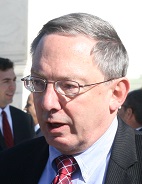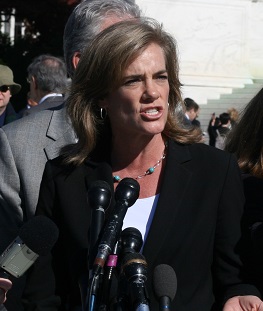By Bob Allen
A divided U.S. Supreme Court debated Nov. 6 whether explicitly Christian prayers at a New York town board’s meetings violate the constitutionally mandated separation of church and state.
“What we heard this morning in the courtroom was a very vigorous exchange between the justices and the attorneys representing the two sides of this debate,” Rob Schenck of the conservative Christian ministry Faith and Action told reporters after Wednesday’s oral arguments in a much-watched case about the proper role of religion in the public square.
The high court is weighing a federal appeals court ruling that the town of Greece, N.Y., violated the Constitution with a policy of opening public meetings with prayers typically led by Christian ministers who offered them in Jesus’ name.
“It is our position that the government has no authority to instruct anyone on the form or content of prayers,” Schenck said. “For the government to tell a citizen he or she is to pray or not to pray is a flagrant violation of the First Amendment’s Free Exercise Clause.”
Schenck said overturning the town’s policy would reduce the 200-year-old tradition of so-called legislative prayers to “innocuous and meaningless prayers to an unknown god.”
“I felt we heard the justices say very clearly that a government official is in no position to dictate how a prayer should be worded,” Schenck said. “None of us want the government telling us what a good prayer is and what a bad prayer is.”
 Douglas Laycock, a University of Virginia law professor who argued the case on behalf of two women — one Jewish and the other an atheist — who claim the policy endorses Christianity and treats non-believers as second-class citizens, said the issue is fairness.
Douglas Laycock, a University of Virginia law professor who argued the case on behalf of two women — one Jewish and the other an atheist — who claim the policy endorses Christianity and treats non-believers as second-class citizens, said the issue is fairness.
“I have defended many Christians over the years,” Laycock said. “I support their free exercise rights. I support their free speech rights. I do not support their right to use the power of government to impose their religion. That is what is going on here.”
“This case is about Christians aggressively imposing themselves on other citizens through the power of government,” he said. “That’s not right.”
The Baptist Joint Committee for Religious Liberty, a 77-year-old organization that represents 15 national and regional Baptist organizations including the Cooperative Baptist Fellowship, joined the United Church of Christ and Presbyterian Church (U.S.A.) in a friend-of-the-court brief arguing against imposing sectarian prayers at government meetings attended by citizens with minority faiths or no faith at all.
 “We are religious organizations that stand for religious liberty, and in this case we stand with those who challenge a prayer practice that would make their political rights incumbent on their participation in a prayer with which they don’t agree,” BJC General Counsel Holly Hollman told reporters. “One’s political standing, one’s political right, should not depend on their adherence to a religion.”
“We are religious organizations that stand for religious liberty, and in this case we stand with those who challenge a prayer practice that would make their political rights incumbent on their participation in a prayer with which they don’t agree,” BJC General Counsel Holly Hollman told reporters. “One’s political standing, one’s political right, should not depend on their adherence to a religion.”
Hollman clarified that the BJC’s position is not against prayer.
“In fact, all religious people should, and many do, pray for their elected officials, but it’s very important to understand it is not the role of government to lead in religious acts,” she said.
“When it does there will be practical problems,” Hollman said. “There will be theological problems.”
“There will be a myriad of things that the court today and counsel today talked about that can’t be resolved consistent with our strong tradition of religious liberty that protects all people, whether they believe or have no belief, without harming government or religious congregations.”
Previous story:
